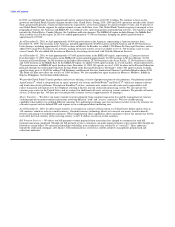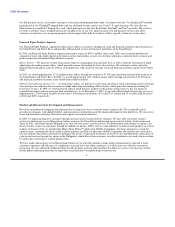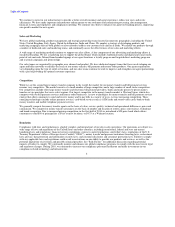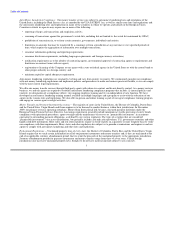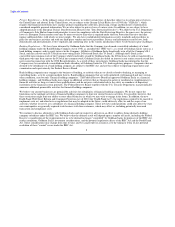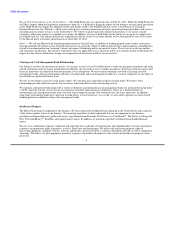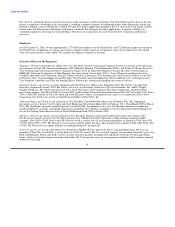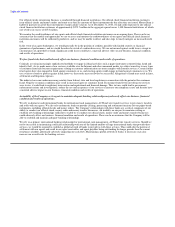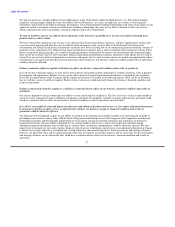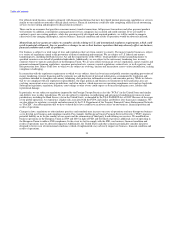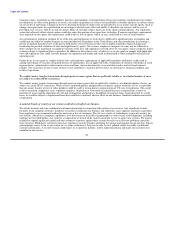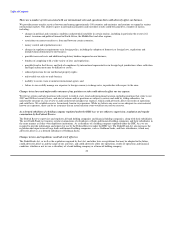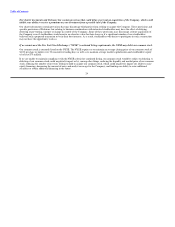MoneyGram 2010 Annual Report Download - page 17
Download and view the complete annual report
Please find page 17 of the 2010 MoneyGram annual report below. You can navigate through the pages in the report by either clicking on the pages listed below, or by using the keyword search tool below to find specific information within the annual report.
Table of Contents
• Our revolving credit facility with a consortium of banks is one source of funding for corporate transactions and liquidity needs. If
any of the banks participating in our credit facility were unable or unwilling to fulfill its lending commitment to us, our short-term
liquidity and ability to engage in corporate transactions such as acquisitions could be adversely affected.
• We may be unable to borrow from financial institutions or institutional investors on favorable terms, which could adversely impact
our ability to pursue our growth strategy and fund key strategic initiatives, such as product development and acquisitions.
If financial liquidity deteriorates, there can be no assurance we will not experience an adverse effect, which may be material, on our
ability to access capital and on our business, financial condition and results of operations.
Continued weakness in economic conditions, in both the United States and global markets, could adversely affect our business,
financial condition and results of operations.
Our money transfer business relies in part on the overall strength of global economic conditions as well as international migration
patterns. Consumer money transfer transactions and migration patterns are affected by, among other things, employment opportunities
and overall economic conditions. Our customers tend to have employment in industries such as construction, manufacturing and retail
that tend to be cyclical and more significantly impacted by weak economic conditions than other industries. This may result in reduced
job opportunities for our customers in the United States or other countries that are important to our business, which could adversely affect
our results of operations. In addition, increases in employment opportunities may lag other elements of any economic recovery.
Our agents or billers may have reduced sales or business as a result of weak economic conditions. As a result, our agents could reduce
their numbers of locations or hours of operation, or cease doing business altogether. Our billers may have fewer customers making
payments to them, particularly billers in those industries that may be more affected by an economic downturn such as the automobile,
mortgage and retail industries.
If general market softness in the United States or other national economies important to the Company's business were to continue for an
extended period of time or deteriorate further, the Company's results of operations could be adversely impacted. Additionally, if our
consumer transactions decline or migration patterns shift due to deteriorating economic conditions, we may be unable to timely and
effectively reduce our operating costs or take other actions in response, which could adversely affect our results of operations.
A material slow down or complete disruption in international migration patterns could adversely affect our business, financial
condition and results of operations.
The money transfer business relies in part on migration patterns, as individuals move from their native countries to countries with greater
economic opportunities or a more stable political environment. A significant portion of money transfer transactions are initiated by
immigrants or refugees sending money back to their native countries. Changes in immigration laws that discourage international
migration and political or other events (such as war, terrorism or health emergencies) that make it more difficult for individuals to migrate
or work abroad could adversely affect our money transfer remittance volume or growth rate. Sustained weakness in global economic
conditions could reduce economic opportunities for migrant workers and result in reduced or disrupted international migration patterns.
Reduced or disrupted international migration patterns, particularly in the United States or Europe, are likely to reduce money transfer
transaction volumes and therefore have an adverse effect on our results of operations.
If we lose key agents or are unable to maintain our Global Funds Transfer agent or biller networks, our business, financial condition
and results of operations could be adversely affected.
Revenue from our money transfer and urgent bill payment services is derived from transactions conducted through our retail agent and
biller networks. Many of our high volume agents are in the check cashing industry. There are risks associated with the check cashing
industry that could cause this agent base to decline. We may not be able to retain all of our current retail agents or billers for other
reasons, as the competition for retail agents and billers is intense. If agents or billers decide to leave our agent network, or if we are
unable to add new agents or billers to our network, our revenue would decline.
14


